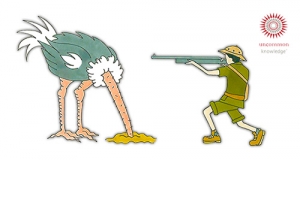Let Go of the Past
How to stop the past spoiling the present and your future
 "Letting the past go" courtesy of kelehen
"Letting the past go" courtesy of kelehenLetting go of the past wasn't even a vague possibility for Megan; she just couldn't stop talking about it. The present and future didn't seem to exist for her. I suspected she'd had lots of the kind of 'therapy' that feels it's best to dig continually into the past; that thousands of hours of therapy had so conditioned her, she now felt only the past existed for her, soaked as it was in bitterness and regret. What had all that historical focusing actually done for her?
Eventually, I gently interrupted her: "You know, Megan, you could gather all your belongings, get your passport, and set sail. You could explore every inch of every shoreline, every state or county, every continent and country in the world. And you know what? Even if you searched for the rest of your life, you'd never... actually find the past anywhere!"
She gawped at me, eyes wide.
My admittedly rather strange observation shocked her. Later she told me that it was as if the room had stopped moving, as if the 'cognitive reframe' had almost had a physical impact. Psychotherapists sometimes specifically use mild shock or surprise to help disassemble rigid and mechanical unhelpful perspectives. Megan had been trained to believe that the past was something she must 'discover' and 'explore'. The problem with these kinds of metaphors is that people almost forget they are metaphors and start to live their lives by them. But an explorer (to continue our metaphor) needs to know where they're going, not just focus on where they've been.
We could help Megan put her past 'in order', but only so that she could 'explore' and 'discover' her present and future life.
Lest you prematurely label me a past ignorer, in my defense I'd like to say, here and now, that certainly we shouldn't ignore the past. In fact we can't ignore it.
The sum of all our yesterdays
We all constantly live in the present and make many choices about our futures because of the past. This is unavoidable. You can only read these words now because your mind relates to past experience with these words. All learning and knowledge rely on continually referencing the past, and many wise decisions about the future are created through recalling what has or hasn't worked before. You only recognize a friend in the street because you reference a past connection with them. In this way, you use the past well.
But doing things unquestioningly because 'it's always been that way' might be a misuse of the past. Tradition may be useful or it may prevent progress, depending on how useful it is. Personally, you have an emotional relationship to past events that steers you helpfully or unhelpfully in the present. I'm going to look at how past learning can cause us problems.
People talk about 'having baggage' or needing to 'move on', having to 'put the past behind them' or 'find closure' when referring to the emotional effects of past events. But what do these metaphors actually mean and how can we really 'let go' and 'move on'?
What 'having baggage' really means
When something intensely emotional happens to us, it is tagged in our brains as hugely significant. Perhaps it was a time we felt we were threatened with the loss of something very important to us. Henceforth, your brain will be on the lookout for anything that vaguely reminds it of that original experience. Your amygdala in your brain (if you want technicality) tries to match new experiences with that original time. This is a way of erring on the side of caution, but it can lead to a 'faulty pattern match' which itself becomes a problem. For example:
- A man who was mugged by a man with a beard now feared all men with beards.
- A woman who'd been abused in her marriage now feared and suspected all men of being sadistic.
- A young man was left heartbroken when his blonde fiancée ended with him. He now feels excruciatingly sad whenever he sees any blonde.
'Faulty pattern matching' happens most clearly when people show symptoms of post-traumatic stress disorder (PTSD), but also in a less severe way whenever we respond unhelpfully or over-emotionally to something.
This is the type of learning that works on the unconscious level. Cognitively, someone knows full well that a firework isn't the same explosive device that nearly killed them years before in a war zone, but emotionally they respond as if it were. If you feel that you just can't forget something, then your brain is relating to it as if it's happening now. If memories keep intruding upon you, you may be experiencing elements of PTSD. People can be extremely traumatized and experience the gamut of symptoms of faulty pattern matches leading to flashbacks, nightmares, and exhaustion leading to depression, to feeling bad whenever they recall being shouted at by their boss, and now finding they've become anxious around authority.
Here are some tips for leaving the past behind you:
- If you have been traumatized and feel as if the past trauma is still very present for you, try to get help from someone skilled in the use of the Rewind Technique or a similar comfortable and fast-acting method that focuses on changing feelings rather than trying to work just on the thinking (cognitive) level.
- If you respond to things in the here and now with more emotion than the situation warrants, ask yourself, "What past situations and feelings do these current feelings resemble?" Once you have located the possible origins of the emotional response, do the next tip:
- List all the ways a new situation, person, or place is different from past places, people, or situations that caused you problems. Consciously review all the differences regularly to prevent yourself tarring everything with the same brush of past experience. Really reflect that circumstances do change, which leads us nicely on to another way the past can disrupt the present: 'Learned helplessness'.
Open the cage door
'Learned helplessness' is really a subset of faulty pattern matching, but tends to be specific to depression and anxiety conditions.
Imagine a bird in a locked cage that learns it's helpless to escape. No matter what it does, it can't fly free. Then, one wonderful day, the cage door is accidently left open. Circumstances have changed; but, oh no, the bird continues to act as if they haven't. It could now fly free, but doesn't. It's still responding as if it's trapped and stuck when it no longer is.
Professor Martin Seligman, who coined the phrase 'learned helplessness', found in research that people, as well as dogs and rats, can all mis-learn to act as if they are still powerless when they no longer are. We may feel hopeless because the past taught us not to recognize opportunity and hope when it arises. This way of relating to the past is a real handicap. Having an overriding helplessness pattern from the past can make us wrongly tag new situations as insurmountable when they're not.
'Moving on' could be replaced with the more descriptive metaphor: 'updating'. We need to learn from the past, but be ready to update those learnings when circumstances alter (as they always do).
- If you suspect you are currently living your life (or parts of it) through the conditioning of 'learned helplessness', remind yourself of what is different now in terms of circumstances and yourself. What's changed?
- Examine what you have learnt from past adversity that can actually help you in future. Rather than just regretting stuff, question specifically how it has productively helped you. One man told me how his childhood fraught with actual and potential violence had helped him become very good at spotting and defusing tensions - skills he now applied to his job as a hostage negotiator. Has your past equipped you to be determined, self-reliant, perceptive, tough, compassionate? Focus sometimes on what you have gained rather than lost from past experience.
We also inevitably draw conclusions about ourselves based on past events. This has its uses, but if our conclusions are based on surveying the past too negatively, we can suffer low self-esteem and fail to recognize areas in which we can or could excel.
How does that happen and what can you do about it?
"I'm just a coward!" The damage of narrow self-labelling
Negative self-labelling based on too narrow a selection of past events is damaging. For example, people may constantly refer back to times when they were mean or anxious whilst downplaying or forgetting past times that tell a different story.
One woman I worked with genuinely saw herself as 'weak, cowardly, and pathetic'. Day after day, she went around believing this about herself. It was the self-view that determined her feelings, actions, and moods.
She based this whole self-label on just a few incidents from a long life. I asked her whether a basically intelligent person could still do stupid things sometimes? Could a basically kind person still act thoughtlessly on occasion? Could a basically lucky person have something unlucky happen to them? She started to get the point that all people occasionally behave in ways that are out of character. The fact that she was so upset about how she'd occasionally behaved meant that these behaviours weren't central to what she was really about. This is not about letting people 'off the hook', but looking squarely at the past in equal measure and not just focusing on the bad.
We explored times in the past that showed how incredibly brave and strong she'd been; times she'd all but forgotten because she'd been so focused on her past 'sins'. Even then, she tried to downplay her positive role in these times, but eventually she learned not to do this.
Don't construct your whole identity around just the bad stuff that happened (or that you did). Seek to counterbalance any self-abusive bias you might have by evenly looking at counter-evidence that will show you not just to be a 'bad/stupid/unlucky' person.
People are often surprised when they discover they can do things they never dreamed they could do. Why did they dream they could never do them? Perhaps because they'd narrowly selected 'evidence' that led them to believe they were 'not good at maths' or 'bad at public speaking' or 'hopeless with people'.
- Aim for balance. Genuinely find times where you got along with someone, spoke out, acted intelligently; and remember that even small examples of these times are useful in tipping the balance away from unfair self-abuse.
The past ain't what it used to be: The dangers of seeing the past through rose tints
Regularly reviewing past happy times is a great thing to do. I highly recommend it; but with a caveat. It's less healthy if:
- The past is always used as a way of highlighting how terrible the present is by contrast.
- We live in the past to such an extent that the opportunities in the present are missed. For instance, when we don't even give a potential new partner a chance because how could they ever match up to our perfect former lover!
Feeling that the past was this golden age of seamless perfection, a time of untrammelled happiness, is way too black-and-white. Comparing this idealized retrospection with the present can lead you to believe the present can never be any good at all. This just spoils what you have now.
It's easy to fall into the trap of feeling: "When I was younger, everything was better!" Interestingly, both younger and older men and women assume that happiness levels are greater in younger people; but research contradicts this assumption, showing that, actually, the older we get, the happier we tend to become (1). Older people widely and repeatedly tend to rate themselves happier than younger people do. Perceiving the past as overly perfect can prevent us enjoying the moment and looking forward to the future.
- Use past happiness and successes to help you feel better about specific situations in the present or future. You might close your eyes, relax, vividly recall a wonderful past time, and then hypnotically imagine yourself drifting into a current or future situation with all those good feelings from the past. This can help you actually use the positive past rather than just lament its passing.
And look for any ways the present might be better than the past, however small. Even if it's that you have learned and gained wisdom.
Life needs to continue right up to the point we die. If at a certain age all we do is look back, we have, in a sense, stopped living.
So the takeaway points from 'Let Go of the Past' are:
- We all refer to the past all the time, but in ways that are often unconscious. This is vital and unavoidable.
- When we misapply or apply too widely emotional responses from the past to present situations in which they are not helpful (such as in 'learned helplessness'), we need to register that circumstances are different and that old responses may have to be updated and refined.
- This can partly be achieved by recognizing that situations can seem superficially the same but actually be very different and by understanding that we ourselves have changed.
- We need to resist the trap of believing the past was so perfect that the present cannot be appreciated or enjoyed at all. We may be over-estimating the past and underestimating the present. Use past happy times to make the present happier rather than focusing on loss.
And finally, remember that none of us are damned by our pasts. In the timeless words of Oscar Wilde: "Every saint has a past and every sinner has a future."
If you are troubled by depression, you may find our self hypnosis sessions for depression helpful.
References
- VA Ann Arbor at the University of Michigan. The researchers conducted an online survey of more than 540 adults who were either between the ages of 21 and 40 or over age 60. Participants were pretty equally divided between men and women. About 35 percent of the younger group and 24 percent of the older group were from ethnic minorities. Each participant was asked to rate his or her own current level of happiness on a scale of 1 to 10, then to rate how happy an average person of their age would be. Next, they were asked to remember or predict how happy they were/would be at age 30 and age 70, and to predict how happy the average person would be at those ages.
Both young people and older people thought young people were happier: people of all ages thought the average 30-year-old would be happier than the average 70-year-old, and that the level of happiness would decline as people aged.
But in fact, people in the older group rated their current level of happiness significantly higher than the people in the younger group.
Happiness, this study suggests, doesn't decline with age; it increases.






